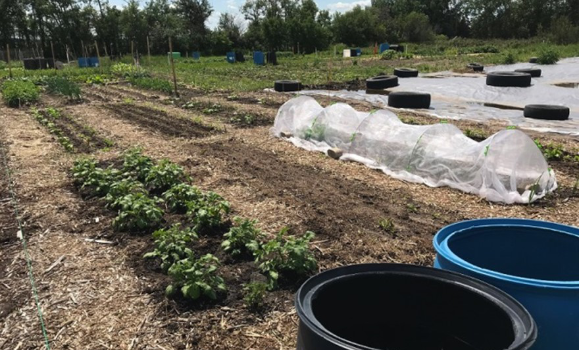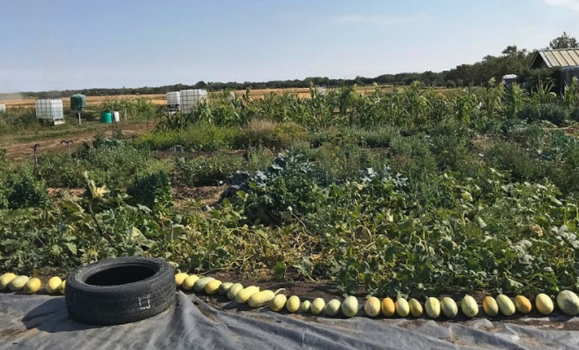News
» Go to news mainCultivating Healing: Growing Through Grief
By Kamryn Findlay
Program Manager, Extended Learning
When Karen Spackman began planning for her retirement, she had a clear goal: to enroll in a Master Gardener program. Her passion for growing food and flowers had been a part of her life since childhood, growing up in a large family with a garden.
In the early 2000s, Karen and her husband visited a local plant sale and noticed a community garden. Their tiny, north-facing backyard had its challenges, so they asked to join. ÔÇ£They welcomed us,ÔÇØ Karen recalls. ÔÇ£We gardened there every summer, and now IÔÇÖm the coordinator.ÔÇØ
Initially, their focus was on growing healthy food for themselves and their neighbors. Over time, it expanded to include donations to the local Food Bank. ÔÇ£It felt great to share what we grew,ÔÇØ she says.
However, tragedy struck when Karen lost her husband of 35 years in the fall of 2019. They had planned to retire together and enjoy their passion for gardening. The subsequent COVID-19 pandemic added to her sense of isolation.
ÔÇ£I had to reassess everything,ÔÇØ Karen explains. To cope, she joined an online grief group and continued working until her retirement in spring 2021. During the pandemic, she connected with two other bereaved seniors at the community garden. ÔÇ£We met every week, socially distanced, and it became a healing space for us,ÔÇØ she shares. ÔÇ£Gardens truly promote emotional healing.ÔÇØ
Gardening has always been important to Karen. ÔÇ£Knowing where my food comes from makes me feel self-reliant in this uncertain world,ÔÇØ she says. ÔÇ£I love experimenting and interacting with nature to grow interesting plants.ÔÇØ
Through the Alberta Master Gardener Training Program, Karen experienced many enlightening moments. ÔÇ£I had a real ÔÇÿaha!ÔÇÖ moment while studying,ÔÇØ she recalls. While working on a paper called ÔÇ£Gardening for Birds,ÔÇØ she discovered the crucial role of native plants in supporting the food web. ÔÇ£For years, I had bird feeders, but I never considered what birds eat without them,ÔÇØ she says. ÔÇ£It connected all the dots for me regarding the importance of native plants.ÔÇØ
Another pivotal experience came during her first course, ÔÇ£Science of Gardening.ÔÇØ ÔÇ£Learning about soil health made me rethink my practices,ÔÇØ Karen explains. It prompted her to convert her personal gardens to no-till and encourage others to do the same.
Now the Coordinator of the Mill Woods Wagner Community Garden, Karen is committed to improving the space. A mentor from the Master Gardeners Association of Alberta plans to visit this season to brainstorm ideas for enhancement. ÔÇ£The mentorship program bridges the gap between learners and Certified Master Gardeners,ÔÇØ she notes.
At Mill Woods Wagner, Karen oversees a garden for the ÔÇÿInteractions Class,ÔÇÖ which includes local high school students with autism. ÔÇ£They engage in picking and digging vegetables, which they then use to make soup,ÔÇØ she says. ÔÇ£I want to include more sensory plants and build on last yearÔÇÖs successes.ÔÇØ
Karen also maintains a ÔÇ£country gardenÔÇØ on the outskirts of Beaumont, where she practices no-till gardening. ÔÇ£Most of what I grow there is donated to friends, family, and the local Bread Run,ÔÇØ she explains. ÔÇ£I see it as my way of contributing to nutrition in my community.ÔÇØ
 Karen's 'country' garden near Beaumont
Karen's 'country' garden near Beaumont
The Alberta Master Gardener Training Program opened new doors for Karen, introducing her to topics like fruit trees, pruning, and growing flowers from seed. ÔÇ£It gave me enough information to explore these areas further,ÔÇØ she says.
For those considering the program, Karen offers this advice: ÔÇ£Find what interests you and expand on it. Keep notes, but focus on what sparks your curiosity. That will keep you engaged for a lifetime.ÔÇØ
 Karen's first attempt at a no-till garden in 2022.  From six plants, she harvested 59 spaghetti squash
Karen's first attempt at a no-till garden in 2022.  From six plants, she harvested 59 spaghetti squash
ÔÇ£What I love most is seeing the light in someoneÔÇÖs eyes when they start asking questions in the garden,ÔÇØ she adds. ÔÇ£ItÔÇÖs magical to watch that curiosity grow.ÔÇØ
Through her journey, Karen Spackman not only cultivates plants but also nurtures a community, transforming grief into growth and sharing the joy of gardening with others.
Recent News
- Holiday Hours
- From Academia to Agriculture: Former PhD student and supervisor launch innovative vertical farming venture
- Community Representative ÔÇæ Animal Care and Use
- New Face on Campus
- Sowing Seeds of Knowledge: A GardenerÔÇÖs Journey with DeAnne Pelchat
- ║┌┴¤│È╣¤═°Advising Summit
- Legacy Awards 2024
- Regenerative Agrourbanism
